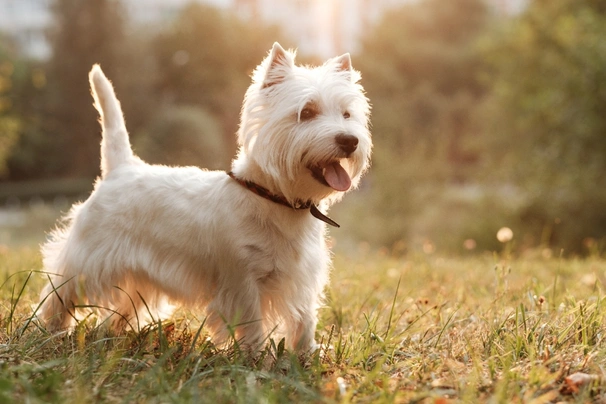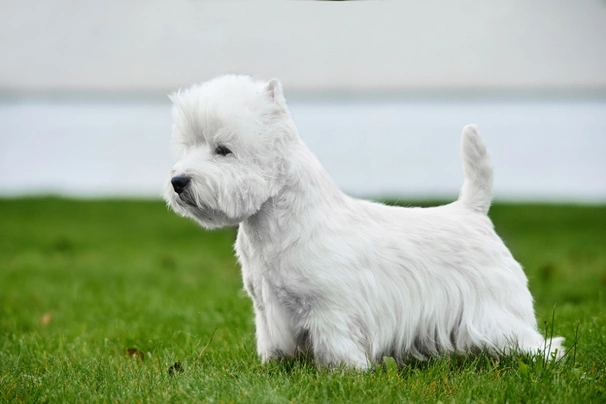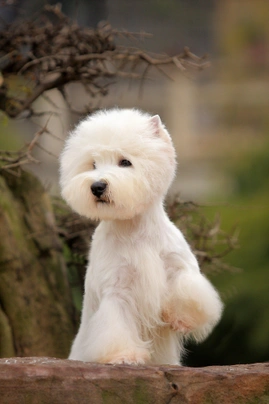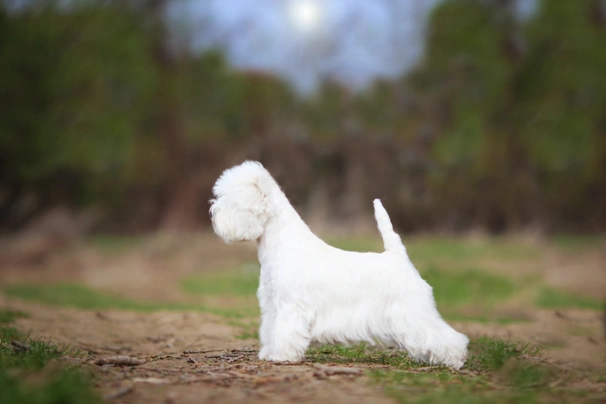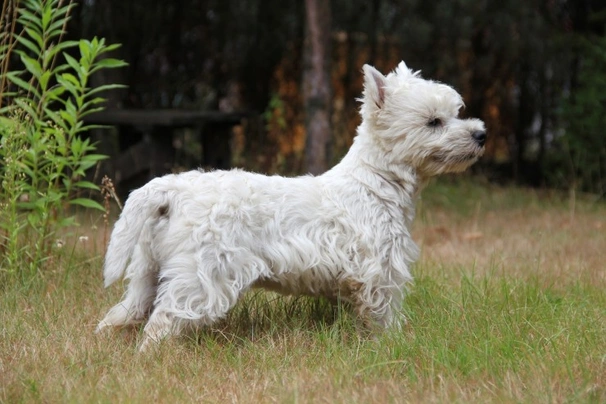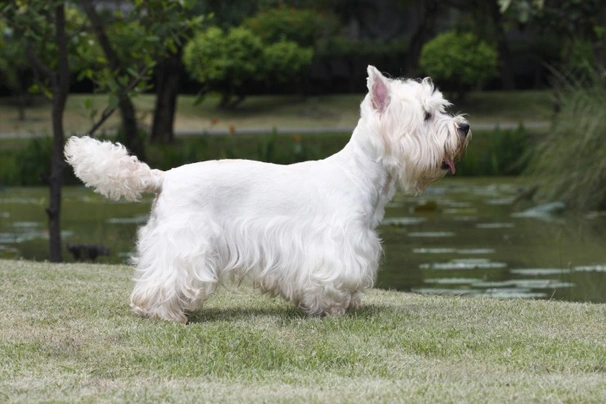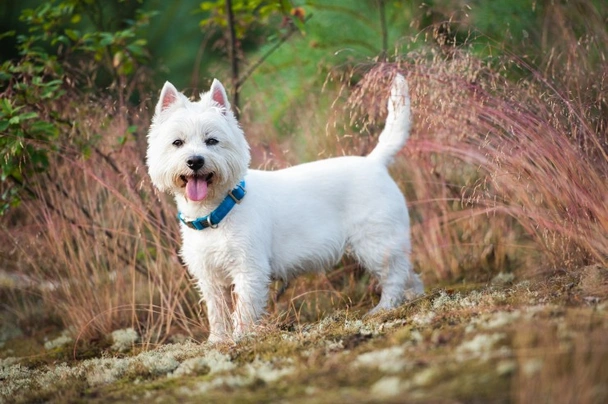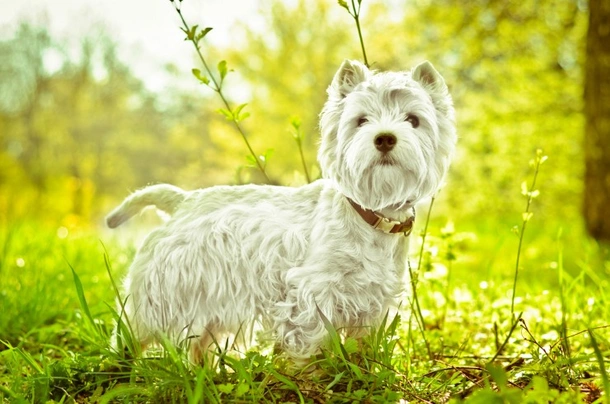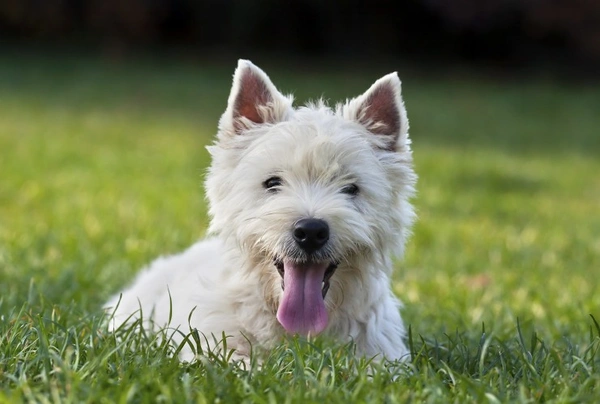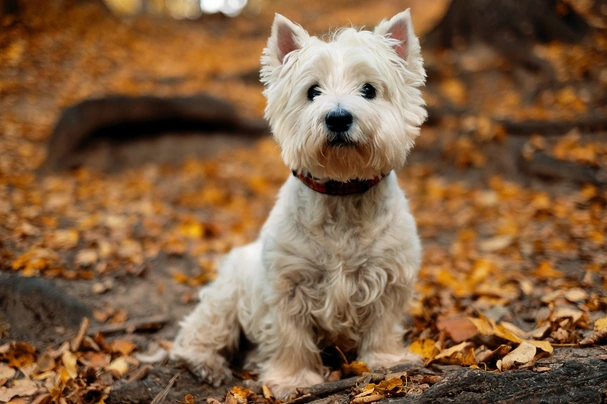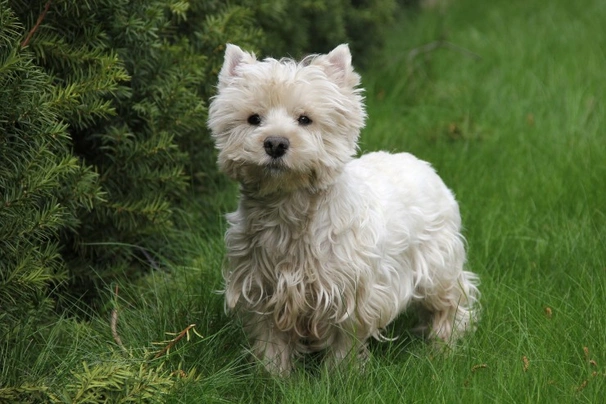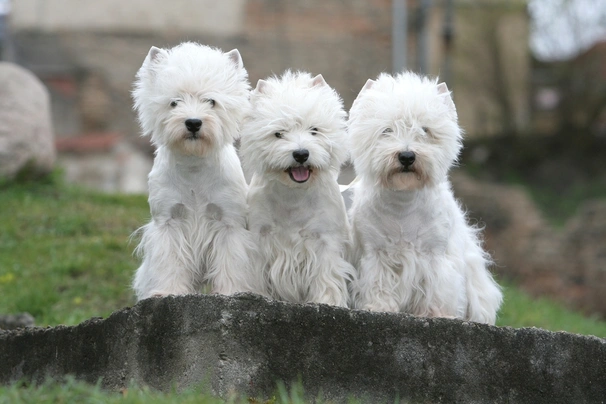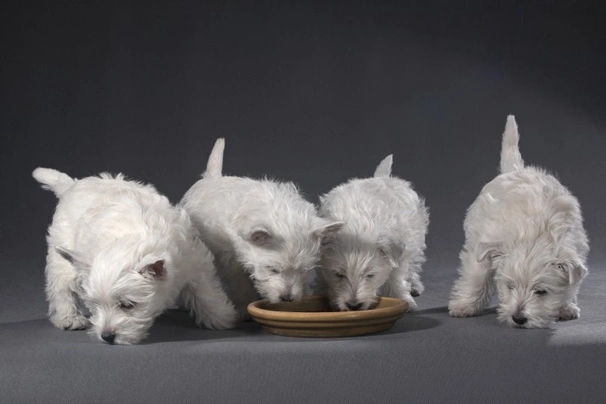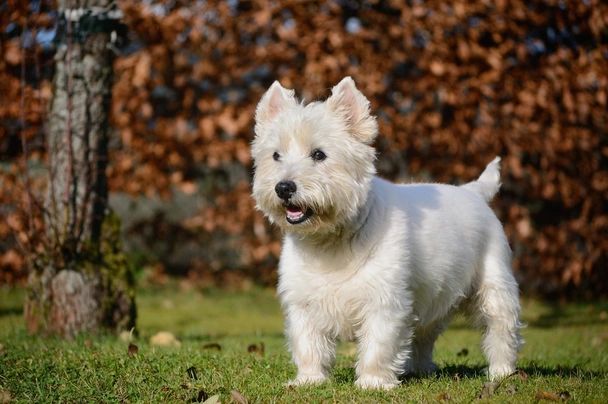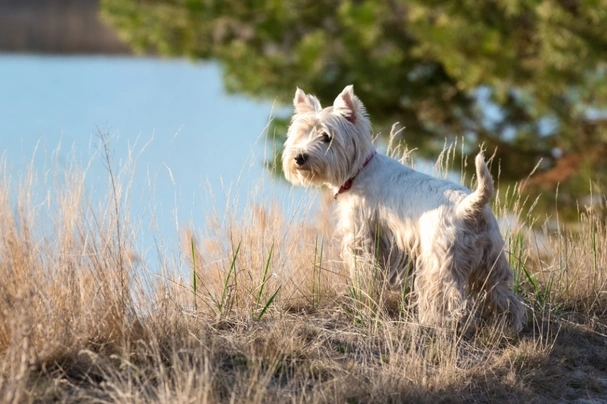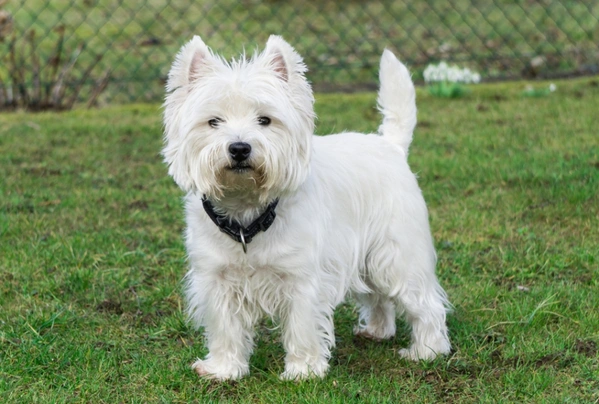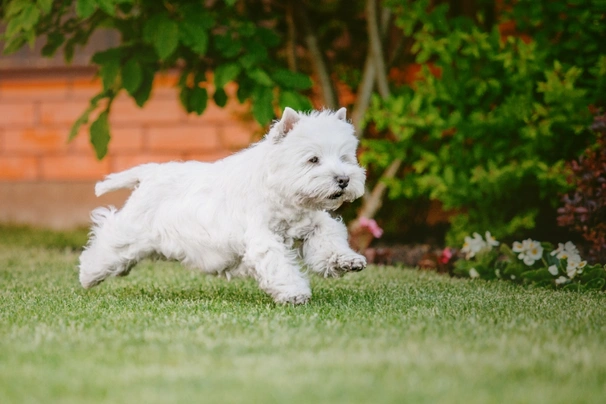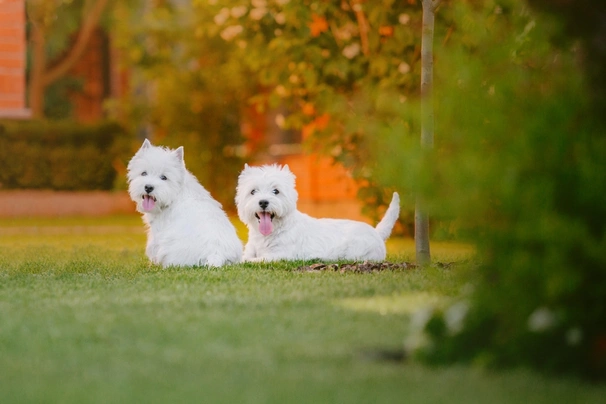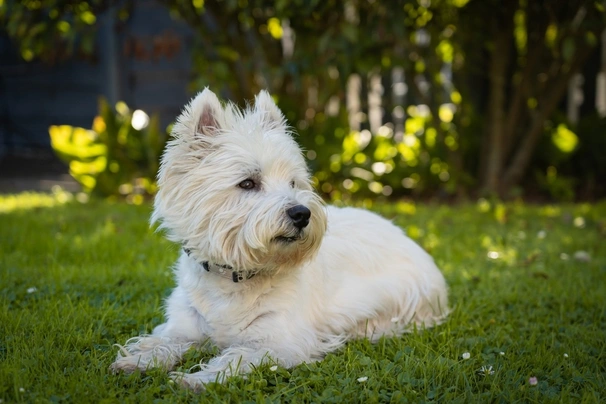West Highland Terrier
Pros
Cons
Introduction of the West Highland Terrier
The West Highland White Terrier or Westie as they are affectionately known has consistently been one of the most popular breeds and for very good reason. Not only are they adorably cute but they boast happy fun-loving and outgoing personalities too. In short they are the perfect choice either as a family pet or companion dog. Westies are also one of the more popular breeds in the show ring and have been for decades. They are intelligent little dogs and love to please which means training a Westie is easy although they do have a bit of a stubborn streak in them.
They are known to get on well with children and love nothing more than to be part of a family but care has to be taken when a Westie is around smaller animals and pets because they are terriers and their instinct to hunt remains very strong even in a home environment. West Highland White Terriers form strong ties with their owners and never like it when they are left on their own they are also high maintenance when it comes to keeping their coats looking good and benefit from being professionally groomed several times a year.
History of the West Highland Terrier
Records of West Highland White Terriers can be traced back to the 15th century when they were first bred to hunt vermin foxes and otters in their native Scotland. The breed shares its ancestry with other well-known Scottish dogs namely the Dandie Dinmont the Cairn Terrier and the Scottie. The breed was created by taking any white puppies from a litter and selectively breeding from them. These dogs were to form the foundation stock of the Westie that’s known and loved today.
There are records that date back to James I that show the King of England asking for a number of these "little white earth dogges" to be sent to him from kennels situated in Argyleshire. It is thought these "dogges" were Westies. There are people who believe that Col Malcolm of Potalloch was responsible for developing white terriers after he accidentally shot one of his favourite brown coloured dogs when he was out hunting. However at that time the breed was known as Poltalloch Terriers.
Other similar white terriers were bred by the Duke of Argyleshire during the 19th century and his dogs were called Roseneath after the estate on which they were bred. As such these Westies were called Roseneath Terriers back in the day. The first time the white terriers were exhibited was late in the 1800's but at the time they were known as White Scottish Terriers. It was not until 1904 that the breed was finally classified as West Highland White Terriers and they were recognised as a unique breed by The Kennel Club.
Today the Westie remains one of the most popular choices as a family pet or companion dog and they are always a great hit both with judges and spectators in the show ring thanks to their adorable looks and they gay happy and outgoing personalities.
Interesting facts about the breed
- Is the West Highland Terrier a vulnerable breed? No they are among the most popular breeds in the UK and other countries too
- Westies have a very high prey drive and will chase anything that moves having originally been bred as "ratters"
- Their white fur kept them safe when out hunting because hunters could clearly see them
- Westies can wriggle their way down the smallest of holes thanks to their body shape
- Westies are prone to getting sunburnt more especially on the tips of their ears
Appearance of the West Highland Terrier
Height at the withers: Males 25 - 28 cm Females 25 - 28 cm
Average Weight: Males 6.8 - 9.1 kg Females 6.8 - 9.1 kg
Westies are small compact white dogs that boast a very endearing look about them thanks to their lovely dark eyes and large black noses. Although small in stature the Westie is a robust and powerful little dog that boasts a slightly domed head that's well covered with hair. They have a very distinct stop accentuated by their dark eyes which are nicely set and their strong level jaws. Their eyes are set widely apart and are medium in size being as dark as possible with dogs boasting heavy eyebrows which adds to their endearing looks. Westies have a very alert and intelligent look in their eyes which is typical of the breed.
Their ears are small which dogs carry upright and they have sharp well-defined tips to them and are covered in smooth short hair. Their mouths are strong with dogs having a regular scissor bite where their upper teeth neatly overlap their lower ones. Their neck is long and muscular which dogs carry proudly being thicker at the base where it merges into the shoulders which slope nicely backwards. Front legs are short and well-muscled being covered in short thick and hard hair.
A Westie's body is compact with dogs having nice level backs and strong broad loins. Chests are deep with well arched ribs at the front. Their hindquarters are muscular and strong being broad with short muscular sinewy back legs with nicely muscled thighs. A Westie's front feet are larger than their back ones and dogs boast having thick pads with all four feet being well covered in short hair and black nails. Their tails are covered in hair without any feathering which dogs carry as straight as possible.
When it comes to their coat a Westie boasts a double coat with a harsher outer coat without any curl that around 5 cm long while the undercoat is more like fur being short soft and close. The accepted colour for registration with the Kennel Club for a Westie is as follows:
- Pure white
Gait/movement
When a West Highland White Terrier moves they do so with a free-moving and flowing action with their front legs nicely extended from a dog's shoulder. Their back legs move freely showing power with dogs having nicely flexed stifles and hocks.
Faults
The Kennel Club frowns on any departures or exaggerations in the breed standard and judge faults on how much they affect a dog's overall health and wellbeing as well as their ability to perform.
Male Westies should have both testicles fully descended into their scrotums and it is worth noting that dogs can be a little larger or smaller and they can be slightly taller or shorter than stated in the Kennel Club breed standard which is given as a guideline only.
Temperament of the West Highland Terrier
The Westie is not only one of the cutest terriers around but they boast having wonderful personalities too. They are the perfect choice for first time owners because these little white dogs like nothing more than to please. This paired to their intelligence means they are easy to train.
Westies are known to be outgoing affectionate albeit "naughty" characters but they form incredibly strong bonds with their owners which in short means they are wonderful watch dogs and soon let their owners know when they are any strangers about. They are totally unaware of their small size which means they will take on the world if they feel they have to and this includes larger dogs.
With this said they can at times have a little bit of a stubborn streak in them which is why their training and education must start as early as possible or a dog might grow up to be a more dominant character which is something that needs to be avoided at all costs. Westie puppies need to be well socialised from a young age which means introducing them to as many new people situations and other animals as soon as they have been fully vaccinated for them to grow up to be well-rounded mature dogs.
Once a West Highland White Terrier has formed a strong bond with an owner they remain totally devoted and loyal to their masters for the rest of their lives which is why they have consistently been such a popular choice as companion dogs and family pets for such a very long time not only here in the UK but elsewhere in the world too.
Are they a good choice for first time owners?
Westies are a great choice for first time dog owners because they are so amenable and adaptable by nature. However they do have a bit of a stubborn streak and will choose to turn a deaf ear to a command when they feel like it which can make their training a little more challenging.
What about prey drive?
West Highland White Terriers were originally bred to be "ratters" and to work alongside hunters and as such they still have a strong prey drive even when kept in a home environment which is why care should always be taken as to where and when a Westie can run free off their leads to avoid any mishaps.
What about playfulness?
Not only are Westies cute they are also real comedians by nature and enjoy nothing more than to keep their owners entertained. They love being busy and it would be a mistake to leave a Westie alone because if boredom sets in they will get up to all sorts of mischief to keep themselves entertained.
What about adaptability?
Westies are highly adaptable little dogs and providing they are given enough mental stimulation and vigorous daily exercise they are just as happy living in an apartment in town as they are living in a house in the country.
What about separation anxiety?
Westies as previously mentioned form strong ties with their owners and being so loyal and devoted they never like to find themselves on their own which typically sees a dog suffer from separation anxiety. This can lead to them being destructive around the home and to bark incessantly which is their way of relieving the stress they are feeling and to get the attention these little dogs crave.
What about excessive barking?
Westies are known to be "barkers" and even when they are gently trained not to bark too much when young the chances are that a dog will still bark at something when they feel like and some Westies bark just for the sake of it. However it is worth noting that all dogs when they are left on their own for too long may start barking to get attention.
Do Westies like water?
Some Westies love swimming whereas others hate getting their feet wet and it would be a big mistake to force a dog into the water because it would just end up frightening them even more. With this said care should always be taken when walking a Westie off the lead anywhere near more dangerous watercourses just in case they decide to leap in.
Are Westies good watchdogs?
Westies make great watchdogs because they are always quick to let their owners know when they are strangers about or when something they don't like is going on in their environment. Westies as previously mentioned like the sound of their own voices and any excuse merits them being vocal.
Intelligence / Trainability of the West Highland Terrier
Westies are known to be intelligent and they do like to please. However they have a bit of mischievous side to their nature which means that their training and education has to start as early as possible and it has to be consistent in order to get the best results. As previously mentioned Westie puppies need to be well socialised from a young age for them to be well-rounded mature dogs or they might grow up to be more dominant characters which makes them harder to train.
It takes more time and patience to train a Westie successfully and even then a dog might decide to turn a deaf ear to a command because they feel like it or because they've spotted something interesting in the distance. With this said some Westies do very well at all sorts of doggy activities which includes thing like agility flyball and even obedience.
They respond well to positive reinforcement training methods but do not accept any sort of rough handling or tough correction which would have an adverse effect on the outcome of their training. It's also important not to "overdo" the treats when training a Westie because they are liable to put on too much weight and this could have a serious impact on their overall health and wellbeing shortening a dog’s life span considerably.
Westie puppies should be taught the basic commands right from the word go and this includes the following commands:
- Come
- Sit
- Stay
- Quiet
- Leave it
- Down
- Bed
Once a Westie is older they can be taught other more complicated commands to ensure they grow up to be obedient and well-behaved in all sorts of different situations and environments bearing in mind that they are known to be a little stubborn at times.
Children and other
Westies are known to be excellent around children loving nothing more than to play games with them. However as with any other breed any interaction between a dog and the kids needs to be supervised by an adult to make sure playtime does not get too boisterous.
They will get on with other dogs as long as they have been well socialised from a young age. However when it comes to cats unless they grow up together it would be unwise to trust a Westie when they are around a feline counterpart. With this said the instinct to "chase" is very strong and even if a Westie has grown up with a cat they are still liable to chase them when the mood takes them just for the fun of it. Care has to be taken when a Westie is around any smaller pets and it would not be wise to leave one alone anywhere near them because it could end up being disastrous.
Health of the West Highland Terrier
The average life expectancy of a Westie is between 12 and 16 years when properly cared for and fed an appropriate good quality diet to suit their ages.
Like so many other breeds the Westie is known to suffer from a few hereditary health issues which are worth knowing about if you are planning share your home with one of these active and good looking dogs. The conditions that seem to affect the breed the most include the following:
- Skin allergies - epidermic dysplasia
- Deafness
- Inherited metabolic liver issues
- Craniomandibular Osteopathy (CMO) - Testavailable through Laboklin
- Lungworm - which is becoming a greater problem in the UK
What about vaccinations?
A Westie puppy would have been given their first vaccination before being sold but it is up to their new owners to make sure they have their follow-up shots on time. The vaccination schedule for puppies is as follows:
- 10 -12 weeks old bearing in mind that a puppy would not have full protection straight away but would be fully protected 2 weeks after they have had their second vaccination
There has been a lot of discussion about the need for dogs to have boosters. As such it's best to talk to a vet before making a final decision on whether a dog should continue to have annual vaccinations which are known as boosters.
What about spaying and neutering?
A lot of vets now prefer to wait until Westies are slightly older before they are spayed or neutered which means they undergo the procedures when they are between 6 to 9 months old. With this said other vets might recommend spaying a female and neutering a male Westie when they are 6 months old but never any younger unless for medical reasons.
What about obesity problems?
Westies are known to like their food and love be spoiled with treats which is why they are prone to putting on a little too much weight. Obesity is a serious problem because when dogs carry too much weight it puts a lot of strain on their hearts and other internal organs. It can even shorten a dog's life by several years.
What about allergies?
Westies are prone to suffering from allergies and more especially epidermic dysplasia which is why it's so important to keep a close eye on the condition of their skin. There are many things that can trigger an allergy in dogs and it is often very hard finding out just what is causing the problem. As such as soon a skin issue flares up it's time to get a Westie to the vet so they can be examined and made to feel more comfortable sooner rather than later.
It can take time and patience when it comes to determining the trigger and it would involve a lot of trial and error when it comes to treatments. The typical triggers for many allergies seen in dogs includes the following:
- Environment
- A reaction to certain chemicals commonly found in household cleaning products
- Seasonal allergies which includes pollen and grasses
- Food which includes certain meats and cereals often used as ingredients in commercially produced dog food
- Tick and flea bites
- Dust mites
- Mould
Participating in health schemes
Although there are no Assured Breeder screening or tests available through the Kennel Club breeders are strongly advised to have stud dogs tested for Cranio Mandibular Osteopathy (CMO) which can be done through vets who send the tests for analysis to a company called Laboklin.
What about breed specific breeding restrictions?
Apart from the standard breeding restrictions set in place by the Kennel Club for all recognised breeds currently there are no further breed specific breeding restrictions in place for the West Highland White Terrier.
What about Assured Breeder Requirements?
Currently there are no DNA tests or screening schemes in place for Assured Breeders under the Kennel Club scheme but all prospective owners should discuss health concerns associated with the breed with breeders before buying a Westie puppy from them.
Caring for the West Highland Terrier
As with any other breed Westies need to be groomed on a regular basis to make sure their coats and skin are kept in top condition bearing in mind they are prone to suffering from skin issues and that they are high maintenance on the grooming front. They also need to be given regular daily exercise to ensure they remain fit and healthy. On top of this dogs need to be fed good quality food that meets all their nutritional needs throughout their lives.
Caring for a West Highland Terrier puppy
West Highland White Terrier puppies are incredibly cute and it is all too easy to spoil them which is a mistake that's often made. Westies are highly intelligent and they know how to wrap their owners around their paws when they want to. As such it's important for owners to start out as they mean to go on by not spoiling a puppy or letting them get away with too much which could end up with a wilful and unruly older Westie.
It's important to get the house and garden ready for a puppy's arrival so they stay safe in their new environment. This means puppy-proofing the home and the outside area if there is one. Electric wires cables garden tools and other implements need to be put out of harm's way just in case a puppy decide to chew on something which could put them in danger.
The timing of when a puppy is introduced to a home is all-important because even if they are confident and outgoing the chances are they are going to be feeling vulnerable having just left their mothers and littermates for the first time. As such it's best to organise their arrival when someone is going to be around for the first week or so which in short means that a puppy would never find themselves on their own in a strange environment.
Puppies also need to sleep a lot for them to develop and grow properly which means setting up a quiet area for them to retreat to when they want to nap. If there are any children in the home they should be taught to leave a puppy alone when they are sleeping and when they are eating. The area should not be too out of the way though because a puppy needs to know there is someone around and owners should be able to hear them if they get into any trouble and need rescuing.
It's a very good idea to fit child gates on doors to limit the amount of space a puppy can roam in which helps keep them safe. Another option is to invest in a good quality playpen for a puppy to stay in which also keeps them from getting underfoot and trodden on.
The documentation a breeder provides for a puppy must have all the details of their worming date and the product used as well as the information relating to their microchip. It is essential for puppies to be wormed again keeping to a schedule which is as follows:
- Puppies should be wormed at 6 months old
- They need to be wormed again when they are 8 months old
- Puppies should be wormed when they are 10 months old
- They need to be wormed when they are 12 months old
Things you'll need for your puppy
Needless to say there are certain items that new owners need to already have in the home prior to bringing a new puppy home. It's often a good idea to restrict how much space a puppy plays in more especially when you can't keep an eye on what they get up to bearing in mind that puppies are often quite boisterous which means investing in puppy gates or a large enough playpen that allows a West Highland Terrier puppy the room to express themselves while keeping them safe too. The items needed are therefore as follows:
- Good quality puppy or baby gates to fit on doors
- A good well-made playpen that's large enough for a West Highland Terrier puppy to play in so they can really express themselves as puppies like to do
- Lots of well-made toys which must include good quality chews suitable for puppies to gnaw on bearing in mind that a puppy will start teething anything from when they are 3 to 8 months old
- Good quality feed and water bowls which ideally should be ceramic rather than plastic or metal
- A grooming glove
- A slicker brush or soft bristle brush
- Dog specific toothpaste and a toothbrush
- Scissors with rounded ends
- Nail clippers
- Puppy shampoo and conditioner which must be specifically formulated for use on dogs
- A well-made dog collar or harness
- A couple of strong dog leads
- A well-made dog bed that's not too small or too big
- A well-made dog crate for use in the car and in the home that's large enough for a Westie puppy to move around in
- Baby blankets to put in your Westie's crate and in their beds for when they want to nap or go to sleep at night
Keeping the noise down
All puppies are sensitive to noise including Westie puppies. It's important to keep the noise levels down when a new puppy arrives in the home. TVs and music should not be played too loud which could end up stressing a small puppy out.
Keeping vet appointments
As previously mentioned a Westie puppy would have been given their first shots but they need to have their follow-up vaccinations in a timely manner. The vaccination schedule for puppies is as follows:
- 10 -12 weeks old bearing in mind that a puppy would not have full protection straight away but would only be fully protected 2 weeks after they have had their second vaccination
When it comes to boosters it's best to discuss these with a vet because there is a lot of debate about whether a dog really needs them after a certain time. However if a dog ever needed to go into kennels their vaccinations would need to be
What about older West Highland Terriers when they reach their senior years?
Older Westies need lots of special care because as they reach their golden years they are more at risk of developing certain health concerns. Physically a West Highland Terrier will start to have a greying muzzle but there will be other noticeable changes too which includes the following:
- Coats become coarser
- A loss of muscle tone
- Westies can either become overweight or underweight
- They have reduced strength and stamina
- Older dogs have difficulty regulating their body temperature
- They often develop arthritis
- Immune systems do not work as efficiently as they once did which means dogs are more susceptible to infections
Older dogs change mentally too which means their response time tends to be slower as such they develop the following:
- They respond less to external stimuli due to impaired vision or hearing
- They tend to be a little pickier about their food
- They have a lower pain threshold
- Become intolerant of any change
- Often an older dog can feel disorientated
Living with a West Highland Terrier in their golden years means taking on a few more responsibilities but these are easily managed and should include taking a look at their diet the amount of exercise they are given how often their dog beds need changing and keeping an eye on the condition of their teeth.
Older Westies need to be fed a good quality diet that meets their needs at this stage of their lives all the while keeping a close eye on a dog's weight and the condition of their skin more especially as they are so prone to suffering from allergies. A rough feeding guide for older Westies is as follows bearing in mind they should be fed highly digestible food that does not contain any additives:
- Protein content should be anything from 14 – 21%
- Fat content should be less than 10%
- Fibre content should be less than 4%
- Calcium content should be 0.5 – 0.8%
- Phosphorous content should be 0.4 – 0.7%
- Sodium content should be 0.2 – 0.4%
Older Westies don't need to be given the same amount of daily exercise as a younger dog but they still need the right amount of physical activity to maintain muscle tone and to prevent a dog from putting on too much weight. All dogs need access to fresh clean water and this is especially true of older dogs when they reach their golden years because they are more at risk of developing kidney disorders.
Grooming of the West Highland Terrier
Westies are high maintenance when it comes to keeping their coats tidy and their skin in good condition. They boast thick double coats with a lot of feathering around their legs and on their bellies which if not groomed on a regular basis tends to matt up very quickly because the hair grows so long. As such these adorable white dogs should be brushed every day and trimmed when necessary.
It is worth noting that not all Westies need to be hand stripped because not all dogs have the same coat textures which can typically be put down to "bad breeding". A Westie with a "correct" coat texture can be described as follows:
- Their outer coat is harsh and is around 5 cm long. Undercoats are more like fur being soft short and close-lying
Westies with harsh coats can be hand stripped but other dogs with silky coats and no undercoat or dogs with fluffy wavy coats cannot be hand stripped as the process would be very painful for them to undergo being hand stripped.
More about a grooming routine
A Westie should be professionally groomed for the first time when they are 16 weeks old when all their top coat legs and head can be removed.
Around 6 to 8 weeks later a Westie can have their 2nd groom when a 3rd of their body coat can be removed.
Around 4 weeks later a Westie can be given their 3rd grooming session when 50% of the remaining longer hair on a dog's body can be removed.
Four weeks later a Westie can be given their 4th grooming session when the rest of the long hair on their body can be removed.
Many professional dog groomers recommend that Westies be hand stripped around every 4 weeks to keep their coats looking tidy bearing in mind that the rate of hair growth can differ from dog to dog.
It is also worth noting that a Westie's head and the way it is trimmed and groomed is one of the breed's defining features which should look like a Chrysanthemum.
As with other breeds Westies shed more during the Spring and then again in the Autumn which is when more frequent brushing is necessary to get rid of any shed and dead hair although with this said they are known to be moderate shedders. It's also a very good idea to check a Westie ears regularly because infections once they flare up can be notoriously hard to treat. In short prevention is a lot easier than cure when it comes to ear infections.
Exercise of the West Highland Terrier
Westies are energetic little dogs that like nothing better than to be kept busy both physically and mentally. This means giving a dog a good hour's exercise every day and ideally this should be a shorter walk in the morning followed by a much longer and more interesting one in the afternoon.
These little dogs like to run free off the lead as often as possible providing it is in a safe environment. Westies love nothing more than to be run around a back garden so they can really let off steam. However the fencing must be very secure to keep these little terriers in because if they find any weakness in a fence they will get out and go off exploring the surrounding area which is just what terriers enjoy doing.
With this said young Westie puppies should not be given too much exercise because their joints and bones are still growing and too much pressure on them could result in causing a dog a few problems later in their lives.
Feeding of the West Highland Terrier
If you get a Westie puppy from a breeder they would give you a feeding schedule and it's important to stick to the same routine feeding the same puppy food to avoid any tummy upsets. You can change a puppy's diet but this needs to be done very gradually always making sure they don't develop any digestive upsets and if they do it's best to put them back on their original diet and to discuss things with the vet before attempting to change it again.
Older dogs are not known to be fussy or finicky eaters but this does not mean you can feed them a lower quality diet. It's best to feed a mature dog twice a day once in the morning and then again in the evening making sure it's good quality food that meets all their nutritional requirements. It's also important that dogs be given the right amount of exercise so they burn off any excess calories or they might gain too much weight which can lead to all sorts of health issues. Obesity can shorten a dog's life by several years so it's important to keep an eye on their waistline from the word go.
Feeding guide for a West Highland White Terrier puppy
Puppies need to be fed a highly nutritious good quality diet for them to develop and grow as they should. As a rough guide a Westie puppy can be fed the following amounts every day making sure their meals are evenly spread out throughout the day and it's best to feed them 3 or 4 times a day:
- 2 months old - 48g to 102g depending on a puppy's build
- 3 months old - 54g to 118g depending on a puppy's build
- 4 months old - 55g to 124g depending on a puppy's build
- 5 months old - 55g to 125g depending on a puppy's build
- 6 months old - 47g to 124g depending on a puppy's build
- 7 months old - 40g to 112g depending on a puppy's build
- 8 months old - 39g to 100g depending on a puppy's build
- 9 months old - 39g to 89g depending on a puppy's build
- 10 months old - 39g to 88g depending on a puppy's build
Once a puppy is 11 months old they can be fed adult dog food.
Feeding guide for an adult West Highland White Terrier
Once fully mature an adult Westie must be fed a good quality diet to ensure their continued good health. As a rough guide an adult Westie can be fed the following amounts every day:
- Dogs weighing 7 kg can be fed 104g to 121g depending on activity
- Dogs weighing 8 kg can be fed 115g to 134g depending on activity
- Dogs weighing 9 kg can be fed 126g to 146g depending on activity
West Highland Terrier price
If you are looking to buy a Westie you would need to pay anything from £300 to over £900 for a well-bred pedigree puppy. The cost of insuring a male 3-year-old Westie in northern England would be £18.86 a month for basic cover but for a lifetime policy this would set you back £42.92 a month (quote as of August 2017). When insurance companies calculate a pet's premium they factor in several things which includes where you live in the UK and a dog's age and whether they have been neutered or spayed.
When it comes to food costs you need to buy the best quality food whether wet or dry to feed your dog throughout their lives making sure it suits the different stages of their lives. This would set you back between £20 - £30 a month. On top of this you would need to factor in veterinary costs if you want to share your home with a Westie and this includes their initial vaccinations their annual boosters the cost of neutering or spaying your dog when the time is right and their yearly health checks all of which quickly adds up to over a £800 a year.
As a rough guide the average cost to keep and care for a West Highland White Terrier would be between £50 to £80 a month depending on the level of insurance cover you opt to buy for your dog but this does not include the initial cost of buying a well-bred pedigree Westie puppy.
Buying advice
When visiting and buying any puppy or dog there are many important things to consider and questions to ask of the breeder/seller. You can read our generic puppy/dog advice here which includes making sure you see the puppy with its mother and to verify that the dog has been wormed and microchipped.
West Highland Terriers are an extremely popular breed both in the UK and elsewhere in the world which means that well-bred puppies command a lot of money. As such with West Highland Terriers there is specific advice questions and protocols to follow when buying a puppy which are as follows:
- Beware of online scams and how to avoid them. You may see online and other adverts by scammers showing images of beautiful Westie puppies for sale at very low prices. However the sellers ask buyers for money up front before agreeing to deliver a puppy to a new home. Potential buyers should never buy a puppy unseen and should never pay a deposit or any other money online to a seller. You should always visit the pet at the sellers home to confirm they are genuine and make a note of their address.
- As previously touched upon Westies are among the most popular breeds in the UK. As such there are many amateur breeders/people who breed from a Westies far too often so they can make a quick profit without caring for the welfare of the puppies their dam or the breed in general. Under Kennel Club rules a dam can only produce 4 litters and she must be between a certain age to do so. Anyone wishing to buy a Standard Poodle puppy should think very carefully about who they purchase their puppy from and should always ask to see the relevant paperwork pertaining to a puppy's lineage their vaccinations and their microchipping
- The Kennel Club together with responsible breeders of West Highland White Terriers strongly advise prospective owners to check a puppy’s lineage because many badly bred Westies have serious problems with the texture of their coats which are all too often too fluffy wavy or softer in texture rather than harsh which they should be

STUNNING HEALTH CHECKED WESTIES
£1,150
West Highland White terrier female 3 years
£500
